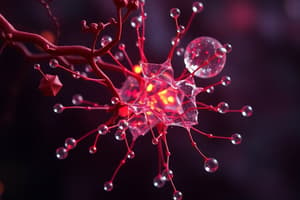Podcast
Questions and Answers
Which branch of science primarily focuses on the study of living organisms?
Which branch of science primarily focuses on the study of living organisms?
- Earth Sciences
- Life Sciences (correct)
- Physical Sciences
- Formal Sciences
What is the first step in the scientific method?
What is the first step in the scientific method?
- Hypothesis
- Analysis
- Observation (correct)
- Experimentation
Which of the following studies would fall under Earth Sciences?
Which of the following studies would fall under Earth Sciences?
- Chemistry
- Biology
- Astrophysics
- Meteorology (correct)
What role does the hypothesis play in the scientific method?
What role does the hypothesis play in the scientific method?
Which of these is considered a physical science?
Which of these is considered a physical science?
How does science contribute to societal advancement?
How does science contribute to societal advancement?
Which branch of science is primarily concerned with mathematical principles?
Which branch of science is primarily concerned with mathematical principles?
What is the last step of the scientific method?
What is the last step of the scientific method?
Flashcards are hidden until you start studying
Study Notes
Definition
- Science is the systematic study of the structure and behavior of the physical and natural world through observation and experimentation.
Branches of Science
-
Physical Sciences
- Physics: Study of matter, energy, and the fundamental forces of nature.
- Chemistry: Study of substances, their properties, reactions, and the changes they undergo.
- Astronomy: Study of celestial objects, space, and the universe as a whole.
-
Life Sciences
- Biology: Study of living organisms, their structure, function, growth, and evolution.
- Ecology: Study of interactions between organisms and their environment.
- Genetics: Study of heredity and variation in living organisms.
-
Earth Sciences
- Geology: Study of the Earth's solid materials, including rocks, minerals, and landforms.
- Meteorology: Study of the atmosphere and weather patterns.
- Oceanography: Study of oceans, including marine organisms and physical properties.
-
Formal Sciences
- Mathematics: Study of numbers, quantities, shapes, and their relationships.
- Logic: Study of reasoning and valid inference.
- Computer Science: Study of computation, algorithms, and information systems.
Scientific Method
- Observation: Identifying a phenomenon or problem.
- Question: Formulating a question based on observations.
- Hypothesis: Proposing a testable explanation.
- Experimentation: Designing and conducting experiments to test the hypothesis.
- Analysis: Interpreting data and results from experiments.
- Conclusion: Drawing conclusions based on the analysis.
- Communication: Sharing findings with the scientific community.
Importance of Science
- Advances technology and medicine, improving quality of life.
- Provides understanding of natural phenomena and environmental issues.
- Informs policy decisions and encourages critical thinking.
- Drives innovation and economic growth.
Key Concepts
- Theory: A well-substantiated explanation of an aspect of the natural world.
- Law: A statement that describes an observable phenomenon or a universal principle.
- Variable: Any factor that can be changed in an experiment.
- Control Group: A group that does not receive the experimental treatment, used for comparison.
Ethical Considerations
- Importance of ethical practices in research, including honesty, integrity, and respect for subjects.
- Consideration of the societal impacts of scientific advancements.
- Responsibility to communicate findings accurately and transparently.
Definition of Science
- Science systematically studies the structure and behavior of the physical and natural world.
- Utilizes observation and experimentation to obtain knowledge.
Branches of Science
-
Physical Sciences
- Physics: Investigates matter, energy, and fundamental forces.
- Chemistry: Examines substances, their properties, and reactions.
- Astronomy: Explores celestial objects, space, and the universe.
-
Life Sciences
- Biology: Studies living organisms and their evolution.
- Ecology: Analyzes interactions between organisms and their environment.
- Genetics: Focuses on heredity and variation in organisms.
-
Earth Sciences
- Geology: Investigates Earth's solid materials, including rocks and minerals.
- Meteorology: Studies atmospheric conditions and weather patterns.
- Oceanography: Examines oceans, marine life, and physical properties.
-
Formal Sciences
- Mathematics: Investigates numbers, quantities, shapes, and relationships.
- Logic: Studies reasoning and valid inference.
- Computer Science: Explores computation, algorithms, and information systems.
Scientific Method
- Observation: Recognizing a phenomenon or issue.
- Question: Developing inquiries based on observations.
- Hypothesis: Proposing a testable explanation for the observations.
- Experimentation: Designing experiments to test the hypothesis.
- Analysis: Interpreting results and data from experiments.
- Conclusion: Drawing conclusions grounded in analysis of data.
- Communication: Sharing results and findings with the scientific community.
Importance of Science
- Drives advancements in technology and medicine, enhancing quality of life.
- Enhances understanding of natural phenomena and environmental concerns.
- Informs policy decisions and promotes critical thinking among the public.
- Fuels innovation and stimulates economic growth.
Key Concepts
- Theory: A well-substantiated explanation for aspects of the natural world.
- Law: Describes observable phenomena or universal principles.
- Variable: Any factor that may alter during experimentation.
- Control Group: A baseline group that does not receive experimental treatment, used for comparison.
Ethical Considerations
- Emphasizes ethical practices in research, focusing on honesty and integrity.
- Acknowledges the societal implications of scientific advancements.
- Stresses the importance of accurate and transparent communication of findings.
Studying That Suits You
Use AI to generate personalized quizzes and flashcards to suit your learning preferences.




